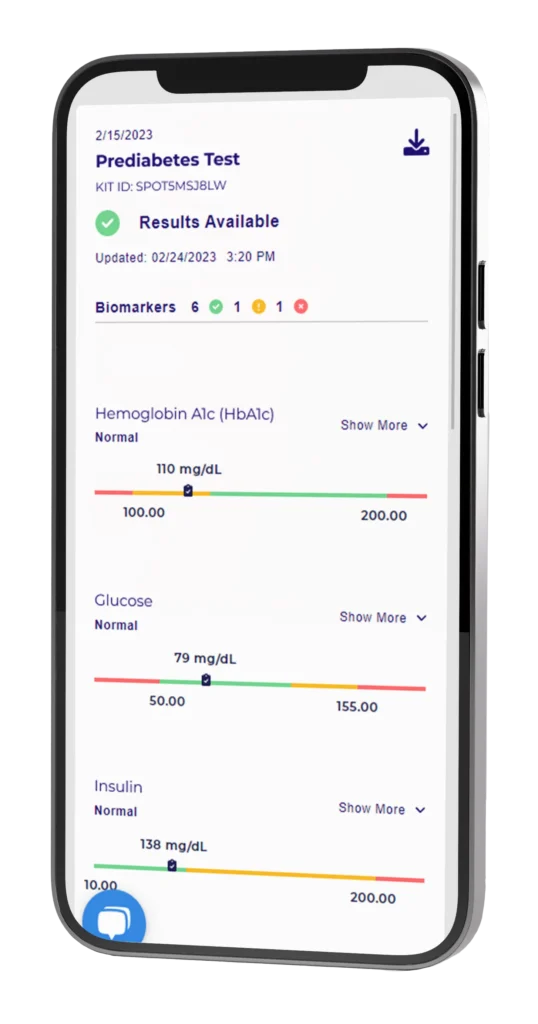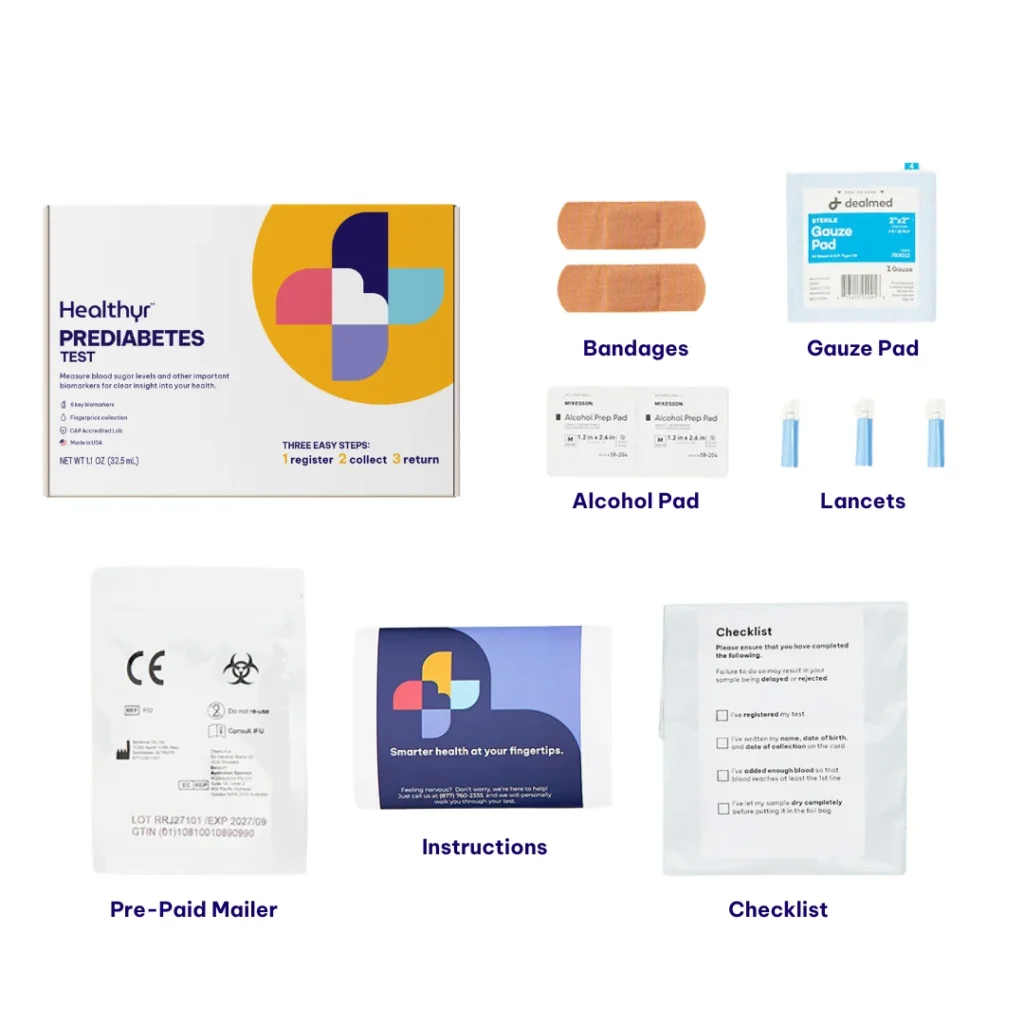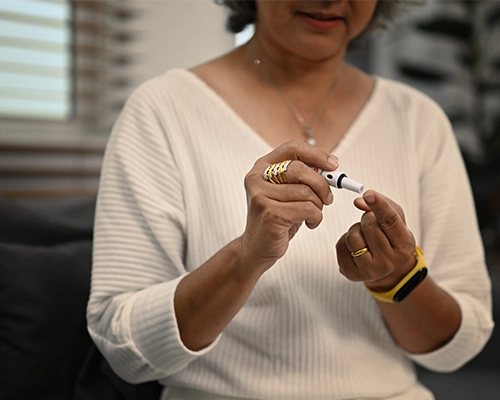Prediabetes Health Test
$79.99
Free Shipping
Diabetes prevention starts with risk assessment and routine screening. Our at-home prediabetes test is the easiest way to gain comprehensive insight into your blood sugar levels.
Not available in NY State.
Tests For:
Hemoglobin A1c (HbA1c), Creatinine, Glucose, Insulin, Vitamin B12 (Cobalamin), and High-Sensitivity C-reactive Protein (hs-CRP)

Pay in 4 easy payments with PayPal Pay Later or Afterpay
- FSA/HSA Eligible
- For adults 18+
- Results in 7 days
- FSA/HSA Eligible
- For adults 18+
- Results in 7 days
Biomarkers tested
Creatinine
Creatinine is a byproduct of normal muscle function that is filtered out of your blood by your kidneys and exits your body in urine. Diabetes can impair the kidneys’ ability to remove creatinine from blood. Measuring creatinine can help understand whether your kidneys are functioning properly.
Glucose
Glucose is the most abundant sugar found in your blood. It comes directly from the foods you eat and is released by the liver and other tissues between meals to supply a steady source of energy to your body. Sometimes, glucose leves may become too high (hyperglycemia) or too low (hypoglycemia). Measuring glucose levels in blood may help diagnose someone with diabetes.
Hemoglobin A1C (Hba1c)
A hemoglobin A1c (HbA1c) test measures the amount of sugar (glucose) attached to hemoglobin. This biomarker indicates your average blood sugar level over the past three months, which may be useful in identifying people suffering from diabetes or prediabetes. In people with known diabetes or prediabetes, HbA1c levels help indicate how well these conditions are being managed.
High-Sensitivity CRP
High-sensitivity C-reactive protein (hsCRP) is a test to measure inflammation in your body, which may be caused by injury, infection, chronic disease, or certain medications. In combination with the other biomarkers on this panel, it may be helpful in determining if you have inflammation associated with diabetes, prediabetes or lipid disorders.
Insulin
Insulin helps regulate the amount of sugar in your blood. Insulin levels along with glucose levels and HbA1c can help a care provider determine if you have developed insulin resistance, which may make it difficult for your body to properly regulate blood sugar. Insulin may also be used to help determine type I vs type II diabetes.
Vitamin B12
Vitamin B12 (cobalamin) plays an essential role in red blood cell formation, cell metabolism, nerve function and the production of DNA. Metformin is a common and effective treatment for diabetes and pre-diabetes, but may lower your B12 levels. Measuring B12 can help a care provider determine if metformin is an appropriate treatment option for you or if you could benefit from B12 supplements.
Biomarkers tested
Hemoglobin A1c (HbA1c)
Creatinine
Glucose
Insulin
Vitamin B12 (Cobalamin)
High-Sensitivity CRP
What is it and how does it affect me?
Creatinine is a byproduct of normal muscle function that is filtered out of your blood by your kidneys and exits your body in urine. Diabetes can impair the kidneys’ ability to remove creatinine from blood. Measuring creatinine can help understand whether your kidneys are functioning properly.
What is it and how does it affect me?
Glucose is the most abundant sugar found in your blood. It comes directly from the foods you eat and is released by the liver and other tissues between meals to supply a steady source of energy to your body. Sometimes, glucose leves may become too high (hyperglycemia) or too low (hypoglycemia). Measuring glucose levels in blood may help diagnose someone with diabetes.
What is it and how does it affect me?
A hemoglobin A1c (HbA1c) test measures the amount of sugar (glucose) attached to hemoglobin. This biomarker indicates your average blood sugar level over the past three months, which may be useful in identifying people suffering from diabetes or prediabetes. In people with known diabetes or prediabetes, HbA1c levels help indicate how well these conditions are being managed.
What is it and how does it affect me?
High-sensitivity C-reactive protein (hsCRP) is a test to measure inflammation in your body, which may be caused by injury, infection, chronic disease, or certain medications. In combination with the other biomarkers on this panel, it may be helpful in determining if you have inflammation associated with diabetes, prediabetes or lipid disorders.
What is it and how does it affect me?
Insulin helps regulate the amount of sugar in your blood. Insulin levels along with glucose levels and HbA1c can help a care provider determine if you have developed insulin resistance, which may make it difficult for your body to properly regulate blood sugar. Insulin may also be used to help determine type I vs type II diabetes.
What is it and how does it affect me?
Vitamin B12 (cobalamin) plays an essential role in red blood cell formation, cell metabolism, nerve function and the production of DNA. Metformin is a common and effective treatment for diabetes and pre-diabetes, but may lower your B12 levels. Measuring B12 can help a care provider determine if metformin is an appropriate treatment option for you or if you could benefit from B12 supplements.
Results you can trust + understand
- At-home diagnostic test
- Easy finger prick collection
- Lab results within days
- Track your lab information all in one place
- Secure portal with personalized next steps




Your kit comes with everything you need to collect your sample
- Lancets
- Pre-paid Mailer
- Bandages
- Alcohol Pad
- Checklist
- Gauze Pad
- Instructions
- Takes just 15-20 minutes
- Discreet packaging
- CLIA Lab Certified
- Takes just 15-20 minutes
- Discreet packaging
- CLIA Lab Certified
How it works
Register
Register your test online using the unique ID number that comes with the kit.
Collect
Following the instructions provided, collect your sample – it’s fast and easy!
Return
Mail your sample to our lab using the prepaid envelope included in your test kit.
Results
Receive your private HIPAA compliant results to your Healthyr portal in 3 days!


Test Smarter, Not Harder
Healthyr uses microsampling technology to offer health tests that can be done in the comfort of your home. There is no need to visit a medical professional or lab– you collect your sample yourself using a simple finger prick.
This test is for you


If you have diabetes or prediabetes and want to monitor your condition.
By testing biomarkers related to blood sugar, kidney function, and inflammation, this test can help you monitor your condition and assess whether your diet, lifestyle, and medications are working for you.


If you have a family history of diabetes or prediabetes.
If you have a close relative such as a parent, sibling, or grandparent who has been diagnosed with diabetes or prediabetes, you may be at greater risk of developing these conditions yourself. Testing biomarkers related to prediabetes regularly can help you catch warning signs early.


If you have polycystic ovary syndrome (PCOS).
PCOS is one of the most common causes of female infertility, among a host of other serious health problems such as diabetes, heart disease, high blood pressure, sleep apnea, and stroke. If you are experiencing insulin resistant PCOS, testing your Prediabetes risk can help identify ways in which to better manage your condition.


If you are pregnant.
Gestational diabetes is a form of diabetes that develops in pregnant people and if untreated, can lead to complications. Gestational diabetes often has no symptoms so the only way to identify the condition is to test. However, this test should not be used to replace a gestational diabetes test ordered by your physician.
About our labs and science
Accuracy
+
Reliability
Lab Safety
+
Sterility
Privacy
+
Security
Our tests use an accurate and reliable form of microsampling called Dried Blood Spot Testing. This form of testing has been used since the 1960s in Neonatal care and for testing in remote locations. You may be familiar with the heel prick performed on newborns during their initial health assessment– this is Dried Blood Spot Testing.
Our state-of-the-art lab is CLIA-certified and CAP-accredited. We pride ourselves on our use of validated and reliable testing methods as well as our stringent quality control measures.
If you would like to learn more about our lab processes and accreditations, check out our labs & science page.
Healthyr adheres to strict privacy and security measures to protect your personal health information. Our technology has encryption and safety protocols in place and every employee, from customer service to CEO, is trained in HIPAA compliance.
Frequently Asked Questions
Your blood test is most accurate if you take it fasted, meaning before you have anything to eat or drink (other than water). We recommend taking it first thing in the morning.
Using the Kit ID number, register your test on behealthyr.com. This number is anonymous in our system but allows us to notify you when your test arrives at the lab and your results are ready. It also ensures the lab is able to connect your results to you.
Next, take a moment to get your blood flowing. This will help make your sample collection easier. Drink a tall glass of water for hydration, then wash your hands for a least one minute in warm water to improve circulation and blood flow.
Clean the finger you want to prick with the alcohol wipe. Remove the lancet cap then hold the lancet against the tip of your finger. Press the lancet button to perform the finger prick. Next, hold your pricked finger over the ADX card’s sample collection window. You can gently squeeze your finger to get more droplets (you’ll need about 8 in total to fill the card). You may also perform a “milking” motion, applying gentle pressure on either side of the base of your finger and slowly moving toward the fingertip.
Once filled, leave your ADX card to dry for at least one hour. Meanwhile, clean up and dispose of the used collection tools by sealing them into a bag and placing them in the garbage. As soon as your sample is dry, place it into the sample bag and then slide it into the prepaid envelope. You’ll want to mail your test the same day, so head to your nearest mailbox and drop it inside.
You will be notified when your sample arrives at the lab and then again when your results are ready to view.
Prediabetes is a condition in which blood sugar levels are higher than normal but not high enough to be classified as diabetes. Having prediabetes increases the risk of heart attack and stroke and should be treated by a healthcare provider.
Most people with prediabetes do not experience any symptoms. However, some may have symptoms such as increased thirst, frequent urination, and blurred vision.
Yes, prediabetes can be reversed with lifestyle changes such as losing weight, increasing physical activity, and eating a healthy diet.
Many people with diabetes, prediabetes, and PCOS are prescribed metformin, a common and effective treatment for these conditions. Measuring B12 can help a care provider determine if metformin is an appropriate treatment option for you or if you could benefit from B12 supplements.
If left untreated, prediabetes can lead to type 2 diabetes, heart disease, and stroke.
Your results are most accurate if you take your test while fasted. We recommend taking your Prediabetes Test first thing in the morning before you eat or drink anything (other than water, of course!) to ensure accurate results. This includes supplements, so please wait until after your test to take your morning multivitamin or similar.
It is recommended that adults over the age of 45 get tested for prediabetes every three years. However, if you have risk factors for prediabetes, such as being overweight or having a family history of diabetes, you may need to get tested more frequently.
There are no medications specifically approved to treat prediabetes. However, medications used to treat type 2 diabetes, such as metformin, may be used to help lower blood sugar levels in people with prediabetes.
Yes! There are a number of benefits to taking this test if you are a type 1 or type 2 diabetic. The results from this test can give you insight into how well your condition is currently managed and empower you with the information you need to take next steps to improve your health.
There are a number of options available if you receive an abnormal result. Depending on the biomarker out of range, you may choose to speak with your PCP or book a low-cost, same-day telehealth appointment here. In some cases, your physician may recommend medication or a prescription-strength supplement to help improve your levels. Our pharmacy service can help with that. Alternatively, if you are experiencing a nutrient deficiency such as low Vitamin B12, you may opt to start taking a multivitamin or targeted supplement to improve it.
Yes. Taking this test while pregnant can help identify Gestational Diabetes. However, this test should not replace any Gestational Diabetes testing ordered by your physician.
Yes, there is no reason you cannot take the Prediabetes Test while on your period.
No, medications will not interfere with the accuracy of the test. However, your results may reflect the impacts that certain medications may be having on your biomarker levels.
No, supplementation will not interfere with the accuracy of the test. However, your results may reflect the impacts that medication or vitamin supplementation may have on your blood biomarkers.
No, insurance is not required for any of Healthyr’s at-home health tests.
Nope! Everything, from lab fees to the envelope you mail your sample in, is included in the price of your test.
Have more questions? Contact us!
Our team of experts is available Monday-Friday 9 AM – 9 PM EST to answer your questions, troubleshoot issues, and provide guidance on best practices.

